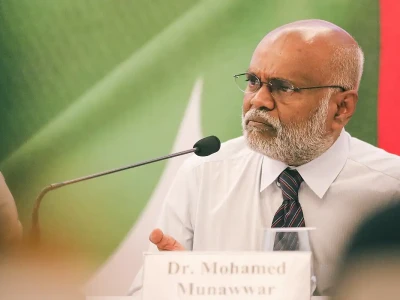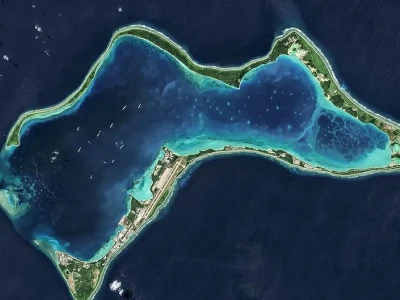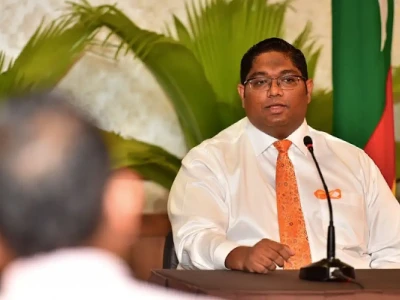
Maldives says took Mauritius side to uphold 'unwavering' anti-colonial policy
The government has maintained that the Maldives-Mauritius dispute is completely different from it.
Top Stories
Maldivian foreign ministry said on Tuesday said that the Maldives decided to vote in favour of Mauritius at the United Nations on the issue of sovereignty of the Chagos islands, based on the Maldives-Mauritius relations and the anti-colonial policy adopted at the UN General Assembly since the country's independence.
Supporting countries facing colonial slavery is a way to maintain the "consistency" of the country's foreign policy, it said.
In a press release issued early morning, the foreign ministry said this after it came to light on Thursday that the Maldives had changed its stand in August after voting in the UN General Assembly against a 2019 resolution calling on the UK to hand over the Chagos islands to Mauritius within six months.
The government announced its decision to support Mauritius instead of the UK at the United Nations during the hearing of a petition filed by Mauritius before the International Tribunal for the Law of the Seas (ITLOS) seeking to designate the maritime borders of Mauritius and Maldives between Chagos in the south of the Maldives.
While there has been criticism that a change in the government's stance on the Mauritius-UK dispute could hurt the Maldives in the tribunal, the government has maintained that the Maldives-Mauritius dispute is completely different from it.
According to the foreign ministry, the Maldives has decided to vote in favour of Mauritius in a resolution submitted to the UN General Assembly on the UK's separation of Chagos from Mauritius in 1965. However, not opposing the resolutions in the General Assembly on the Chagos issue would mean that the Maldives would "not change anything or stand that has been held before" in the ongoing dispute between the Maldives and Mauritius at ITLOS, the statement said, adding that the Mauritian government will be informed of the same.
'Unwavering policy'
The foreign ministry said that since the Maldives gained full independence from the UK in 1965 and became a member of the United Nations the same year, all the governments that have come so far have raised their voice against colonialism in the international arena.
"This is an unwavering stand that has been a top priority in the country's foreign policy," the ministry said.
However, in 2019, the Maldives opposed the UN resolution calling for the handing over of the Chagos to Mauritius based on the fact that Mauritius had formally objected to the Maldives' request to the relevant international commission to expand the country's continental shelf beyond 200 nautical miles.
This is a separate case from Mauritius' proposal to ITLOS to decided the maritime borders of the two countries.
Meanwhile, senior advocate Prof Payan Akawan, representing the Maldives during the ITLOS proceedings, also said Monday that although agreements have been made between the Maldives, India and Sri Lanka for the Exclusive Economic Zone (EEZ) in the north of the Maldives, the south of the Maldives has not been separated in the same way. He said the south could not be separated from the Maldives as it had not been determined in advance who had sovereignty over the Chagos islands.
How did Maldives-Mauritius dispute come about?
The foreign ministry noted that it had been several years since the native population of the Chagos islands were driven out of their homes and Chagos placed under British colonial rule.
In 2017, the UN General Assembly sought the International Court of Justice's (ICJ) preliminary opinion on the matter, and in 2019, the ICJ suggested that the Islands of Chagos would fall under Mauritius sovereignty.
The same year, the UN General Assembly adopted a resolution based on that recommendation. Mauritius went to ITLOS to separate Chagos' maritime boundary from the Maldives on the basis of the ICJ's earlier advice.
The Maldives has failed to plead before the tribunal that Mauritius cannot file the case. The tribunal had last year ruled that since Mauritius was the sovereign authority of Chagos, the dispute over the division of the disputed territory could continue.
ITLOS' ruling on the Maldives' preliminary objection was a major factor in the Maldives' voting against Mauritius at the UN in 2019 and changing its stand this year.
Under the Law of the Seas, a treaty in which the Maldives is a party to, every country with a coast is designated as its Exclusive Economic Zone (EEZ) of 200 miles from the coast. However, if the EEZ of two countries overlaps, the procedure to be followed is to divide the disputed area between the two countries. The crux of the dispute over the separation of the Maldives and Mauritius is the existence of such an overlapping territory.
The Maldives also recognises the need to divide the area. Mauritius and the Maldives are at loggerheads over how to divide the region.
Speaking virtually from Hamburg, Germany, Payan said at a press conference at the President's Office Monday evening to clarify the facts of the case:
-
The size of the overlapping area on both sides is about 90,000 square kilometres
-
There is no difference of opinion in 95% of the area; the problem is in only 5% of the area
-
The disputed area covers about 3,000- 4,000 sq km
"Both the countries will get around 50/50 areas. But any one person can get an area of 3,000 or 4,000 sq km more," said the professor, who has 35 years of experience in the field of maritime law.
"The Maldives defended our points very strongly. All of us did the best we could on it."
The President's Office said on Sunday that the Maldives had never claimed sovereignty over Chagos.




